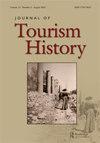Enjoying Europe, yearning for Russia? Russian travel writing on the Baltic provinces during the 19th century
IF 0.9
Q4 HOSPITALITY, LEISURE, SPORT & TOURISM
引用次数: 0
Abstract
ABSTRACT After the end of the Napoleonic Wars it became popular in the Russian Empire to investigate one’s own country. Inspired by Alexander Bestuzhev-Marlinskii’s bestseller A Journey to Reval (1821), the Russian elite also travelled through the Baltic provinces with their romantic medieval ruins and Hanseatic cities. During the first half of the nineteenth century, Baltic German culture was usually understood as enhancing Russia’s imperial diversity and ‘Europeanising’ the state. From the 1830s onwards, travel accounts concentrated on traces of the empire in the region and imagined the city of Reval/Tallinn as a site of memory for Russia’s first emperor, Peter I. This article argues that Russian travel writing on the Baltic provinces used tourism imaginaries that mirrored a growing imperial consciousness in which the Baltic provinces became more ‘Russian’ in the perceptions of the Russian public. This process has to be seen in the context of the nationalisation of Russian elite perceptions that also affected the general idea of this region as culturally ‘German’. In the end, the better accessibility of the region due to infrastructural modernisation paradoxically contributed to a growing sense of alienation, the romantic attraction of ‘Europeanness’ turned into a source of threat for the empire.喜欢欧洲,向往俄罗斯?19世纪俄罗斯波罗的海各省游记
摘要拿破仑战争结束后,调查自己的国家在俄罗斯帝国流行起来。受亚历山大·贝斯图切夫·马林斯基(Alexander Bestuzhev Marlinskii)畅销书《Reval之旅》(1821)的启发,俄罗斯精英们还带着浪漫的中世纪废墟和汉萨城市穿越了波罗的海各省。在19世纪上半叶,波罗的海德意志文化通常被理解为增强俄罗斯帝国的多样性和“欧洲化”国家。从19世纪30年代起,旅行记录集中在该地区帝国的遗迹上,并将雷瓦尔/塔林市想象成俄罗斯第一位皇帝彼得一世的纪念地。这篇文章认为,俄罗斯关于波罗的海各省的旅行写作使用了旅游想象,反映了日益增长的帝国意识,在俄罗斯公众的观念中,波罗的海省份变得更加“俄罗斯”。这一过程必须放在俄罗斯精英观念国有化的背景下看待,这也影响了该地区在文化上“德国”的总体观念。最终,由于基础设施的现代化,该地区的可及性得到了改善,矛盾的是,这种疏离感与日俱增,“欧洲性”的浪漫吸引力变成了帝国的威胁来源。
本文章由计算机程序翻译,如有差异,请以英文原文为准。
求助全文
约1分钟内获得全文
求助全文
来源期刊

Journal of Tourism History
HOSPITALITY, LEISURE, SPORT & TOURISM-
CiteScore
0.60
自引率
0.00%
发文量
16
期刊介绍:
The Journal of Tourism History is the primary venue for peer-reviewed scholarship covering all aspects of the evolution of tourism from earliest times to the postwar world. Articles address all regions of the globe and often adopt interdisciplinary approaches for exploring the past. The Journal of Tourism History is particularly (though not exclusively) interested in promoting the study of areas and subjects underrepresented in current scholarship, work for example examining the history of tourism in Asia and Africa, as well as developments that took place before the nineteenth century. In addition to peer-reviewed articles, Journal of Tourism History also features short articles about particularly useful archival collections, book reviews, review essays, and round table discussions that explore developing areas of tourism scholarship. The Editorial Board hopes that these additions will prompt further exploration of issues such as the vectors along which tourism spread, the evolution of specific types of ‘niche’ tourism, and the intersections of tourism history with the environment, medicine, politics, and more.
 求助内容:
求助内容: 应助结果提醒方式:
应助结果提醒方式:


